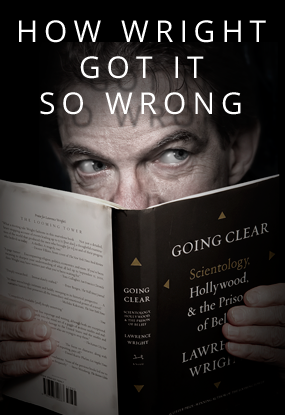A Correction of the Falsehoods in Lawrence Wright's Book on Scientology
Wright grossly misrepresents the policy of “disconnection,” claiming the Church inflicts damage “on families that have been broken apart by the church’s policy of ‘disconnection’—the imposed isolation of church members from people who stand in the way of their longed-for spiritual progress.
”>> True Information: Church policy on this issue is spelled out on the website. The Church of Scientology recognizes that the family is the building block of any society. The Church encourages and helps its members to have excellent family relationships, whether their relatives are Scientologists or not. In fact, family relations routinely improve with Scientology because the Scientologist learns how to increase communication and resolve any problems that may have existed before. Family members of Scientologists are always welcome to visit the Church, to meet other Scientologists and to have their questions about Scientology answered.
There is no policy mandating that a member of the Church of Scientology must disconnect from anyone, let alone family and friends who simply have different beliefs. Disconnection is defined as: “A self-determined decision made by an individual that he is not going to be connected to another. It is a severing of a communication line.”
It is strictly up to the individual if he or she concludes he or she does not want to be connected to a person who is so antipathetic to someone and/or his or her beliefs that it cannot be resolved. It is entirely a personal choice.
Disconnection As Practiced In Other Faiths
Disconnection is not unusual in religion. From Biblical times to the present, members of other religions have exercised the same prerogative when confronted by those who have persistently opposed the practice of their faiths or who have committed crimes against it.
Here are some examples:
Degrees of excommunication in the Catholic Church range from full expulsion from a church with loss of all rights and contacts, to lesser limitations on communication, such as separation from the group at meals or censorship of communications. [Catholic Encyclopedia on “Excommunication”]
The Jehovah’s Witnesses practice of “disfellowship” has been examined by the United States Court of Appeals for the 9th Circuit and found to be a protected religious practice. [Paul v. Watchtower Bible and Tract Society of New York, Inc., 819 F.2d 87. (9th Cir. 1986)
The Amish practice of shunning—avoiding a former member in every way possible, excluding that person from the church and community—is considered a means of guarding the Amish culture. The Amish base this practice on Biblical passages, including Matthew 18:15-17: “lf your brother sins against you, go and show him his fault, just between the two of you … But if he will not listen, take one or two others along. … If he refuses to listen to them, tell it to the church; and if he refuses to listen even to the church, treat him as you would a pagan or a tax collector.” Other references are Corinthians 5:11 and Romans 16:17.
The Church Manual of the First Church of Christ, Scientist, contains several references to excommunication of members for various causes, including apostasy and alteration of Christian Science doctrine. [Manual of the First Church of Christ]
The Church of Jesus Christ of Latter-day Saints practices excommunication, as well as the lesser sanctions of private counsel and caution, informal probation, formal probation, and disfellowship. Excommunication is generally reserved for what are seen as the most serious sins. In most cases, excommunication is a last resort, used only after repeated warnings. [General Handbook of Instructions. Church of Jesus Christ of Latter-day Saints]
Colorado College Professor David Weddle writes that some ultraorthodox Jewish congregations practice an extreme form of disconnection in which a mock funeral is held for apostate members. [“Many Religions Remove Members,” The Register-Guard, March 2, 2003]
The practice of disconnection by Scientologists is a small part of the larger subject of ethics, the fundamentals of which are described in the book Introduction to Scientology Ethics by L. Ron Hubbard. Mr. Hubbard simplified and codified the subject of ethics and developed a workable technology with the aim of applying the subject to an individual’s daily life to bring about increased happiness, prosperity and survival. The subject of ethics includes the identification of the people in one’s environment who hold others back from achieving their full potential. Scientology teaches about the mechanics behind this destructive yet commonplace situation and ways to counteract it. [The Scientology Handbook, “Overcoming the Ups and Downs in Life”] Ethics plays a vital role in an individual’s spiritual development in Scientology.
